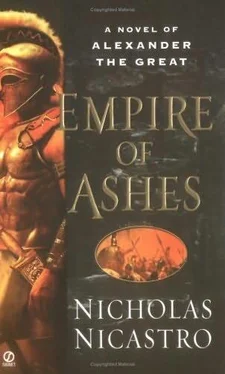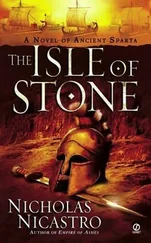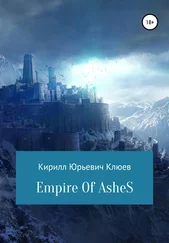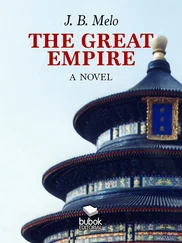Nicholas Nicastro - Empire of Ashes - A Novel of Alexander the Great
Здесь есть возможность читать онлайн «Nicholas Nicastro - Empire of Ashes - A Novel of Alexander the Great» весь текст электронной книги совершенно бесплатно (целиком полную версию без сокращений). В некоторых случаях можно слушать аудио, скачать через торрент в формате fb2 и присутствует краткое содержание. Жанр: Исторические приключения, на английском языке. Описание произведения, (предисловие) а так же отзывы посетителей доступны на портале библиотеки ЛибКат.
- Название:Empire of Ashes: A Novel of Alexander the Great
- Автор:
- Жанр:
- Год:неизвестен
- ISBN:нет данных
- Рейтинг книги:4 / 5. Голосов: 1
-
Избранное:Добавить в избранное
- Отзывы:
-
Ваша оценка:
- 80
- 1
- 2
- 3
- 4
- 5
Empire of Ashes: A Novel of Alexander the Great: краткое содержание, описание и аннотация
Предлагаем к чтению аннотацию, описание, краткое содержание или предисловие (зависит от того, что написал сам автор книги «Empire of Ashes: A Novel of Alexander the Great»). Если вы не нашли необходимую информацию о книге — напишите в комментариях, мы постараемся отыскать её.
Empire of Ashes: A Novel of Alexander the Great — читать онлайн бесплатно полную книгу (весь текст) целиком
Ниже представлен текст книги, разбитый по страницам. Система сохранения места последней прочитанной страницы, позволяет с удобством читать онлайн бесплатно книгу «Empire of Ashes: A Novel of Alexander the Great», без необходимости каждый раз заново искать на чём Вы остановились. Поставьте закладку, и сможете в любой момент перейти на страницу, на которой закончили чтение.
Интервал:
Закладка:
Though Machon is an uncommon liar, he cannot help but ensnare himself as any liar must. Note that several times in his narrative he esteems himself as a skilled warrior. Yet in his account of Chaeronea he clearly states that he was “in the sixth rank of a phalanx eight shields deep.” As we all know, veterans are never placed in the middle of the phalanx! They are either in front, to inspire the rest with their valor, or in the last rank, to prevent cowards from fleeing. So which is it, Machon-are you not such a doughty fighter after all, that you were stuck in the middle? Or was your account of the battle a fiction after all? See how he sits there, having sought so vainly to disrupt me before!
All these matters distract us from the real issue. To my mind, these are and always have been the specific charges against Machon: that he violated his oath to the Assembly, and that he showed impiety. That he failed in his service is proven by his own testimony. By his own admission he was in charge of “managing” Rohjane, yet he also suggests that the woman had a hand in Hephaestion’s death. Once a poisoner, always a poisoner: I have argued myself that this same person slipped the fatal dose to Alexander. So on this count the effect of Machon’s work was far less than negligible-his gentle instruction was the very incubator of her crimes.
Regarding his other claims of service, such as repelling a Mallian raid on the King’s tent, no one else corroborates his story. Yet he admits that he tried to twist Alexander’s mind in an effort to “help” him. What arrogance! As if anything poor Machon would have to say would affect the fate the gods had in store for noble Alexander! It is interesting, though, that Machon admits wishing for the King’s death, and therefore the failure of Greek arms, during the invasion of India. By the gods, what sort of patriotism is that?
I must address the issue of the alleged letter to the governor of Egypt. Gentlemen of the jury, I will not stand here and claim that Cleomenes was a virtuous man, or that he did not deserve the end he found under Ptolemy. He was indeed rapacious, grasping, despicable-any adjective you chose! But to claim that he alone caused the famine in Attica is to engage in irresponsible exaggeration, for the truth is that the shortages began as early as the archonship of Aristophanes, which was almost exactly the time Cleomenes was first appointed tax collector. So unless we are prepared to believe that this man seized control of the grain trade instantaneously, it cannot be true that he caused the famine. Ships carrying grain from the Black Sea were sailed through a war zone during those years; anyone may go down to the Piraeus and talk to the captains there, who will speak of massive disruptions in this trade.
Again, I excuse nothing. That Cleomenes’ greed may have worsened the crisis deserves our contempt. But that is a far different proposition than suggesting Alexander turned a blind eye to crimes that caused hunger in Greece. The letter Machon bandies about, therefore, is a transparent forgery. That Eumenes would even share such a letter, if it had indeed come from Alexander, beggars belief.
Machon’s impiety requires no proof from me, for it festers in the open, in every word that he utters. It lies not only in his contempt for Alexander, and his lack of respect for the beliefs of his elders, and his inordinate fascination with the ravings of Zoroastrians, Brahmins, and other aliens. You may hear it in the way he speaks of Macedon, where great Olympus stands, as if it were foreign territory-or in his eloquence when he describes the charms of notorious courtesans! This last we possibly excuse, as his mother was a whore. But what we cannot excuse is his mendacity, Athenians, for his is the type of thinking that has always placed our city in danger. His affinity for ambiguities of his own making, his championing of the weaker argument over the stronger-these are the legacies of men like Machon. Hearing his testimony, is it any surprise that strumpets, pacifism and sophistry have become our leading exports? For this reason, for his presumption, for his failure, indeed for every reason in the world, I ask you to take the only just course-conviction. Only with that may we begin to repair the damage he has caused to us all.
For the final time, Aeschines brought his statement to a close just as his time expired. Deuteros nudged his friend and Swallow nodded in response. Aeschines had made a strong response to Machon, and had been clever in linking the defendant to that class of professional obfuscators who had been in ill-repute since Athens had first lost her empire. True, only yokels still believed the agora to be crawling with sophists. Philosophy had run out its string, having long since been domesticated, professionalized, and packaged for the consumption of rich men’s sons. Yet nobody was ever disappointed who counted on the votes of ignoramuses.
It was hard to tell now which advocate had the advantage. It was beyond dispute that Machon had an interest in blackening Alexander’s name, and as the orator said, men don’t just fall into such fabulous success. Yet Aeschines could not allay concerns over the pardon of Cleomenes quite so easily. Claims of forgery were easy to make, and could not erase a few simple facts: before Alexander, no hunger-after Alexander, hunger. If it wasn’t by his encouragement of Cleomenes, Alexander had to be responsible for the famine in some other way.
Swallow looked at the sky through the window-daylight was fading. More than for the fate of Machon, he feared he would lose his sleeping spot by the shrine if the trial went on much longer. With a shudder, he realized he might even be forced to go home to sleep with his wife.
Polycleitus indicated to Machon that it was his turn. The defendant took his feet with none of Aeschines’ elan. Instead, he seemed exhausted.
I must tell you that I was not expecting to have to speak again. Never in my life have I had to keep my mouth running for so long! Really, Aeschines, I have new respect for those in your profession. In war, we try to have at it and settle the issue as quickly as possible. In the courts I see it is the longest-winded set of lungs that carries the day.
Before I rest, I must tell you a few more things. First, although Aeschines tries to put the best face on it, he cannot excuse Alexander’s letter to Cleomenes. The argument that Cleomenes was not so bad because he only aggravated your misery is just too subtle for a simple soldier like me to understand. Alexander did not just pardon the man’s past crimes, though that is bad enough. He also forgave in advance any others he would see fit to commit in the future. It therefore follows that if Cleomenes did take it upon himself to starve the Greeks at some later time, that would have been fine with Alexander. I say this without taking any satisfaction in it-had he lived beyond his grief, the King himself would probably have regretted his action. Didn’t he always regret the awful things he did? As it was, the letter was written and delivered, and the offer was never rescinded. These are the facts.
Nor does the mere assertion that the letter is a forgery necessarily make it so. The clerk has the original, and originals of other letters the King sent to the Athenians-I invite the clerk to make a comparison of the documents. Does the seal match? Is the style comparable? I have nothing at all to lose from giving back my time for this purpose.
The clerk just staring, doing nothing, while Polycleitus glanced at the clock.
I see the magistrates are late for dinner, so I will not insist. And so on to my second point, which is this: I do not now bear, nor have ever borne, any ill-will toward Alexander. To say that I try to save my skin by harming his reputation is nothing but a handy supposition by my accuser. Against Aeschines’ word I have almost twelve years of continuous service, which is a long time to serve under someone one supposedly hates! The truth is the very opposite of what my opponent says: as time passed, I grew to esteem him more, for no man had ever faced the challenges he did. To conquer an empire, to become the target of universal flattery, envy, and hope-these would try the sanity of any man. For suffering these assaults who can despise him? I could not have done half as well as he.
Читать дальшеИнтервал:
Закладка:
Похожие книги на «Empire of Ashes: A Novel of Alexander the Great»
Представляем Вашему вниманию похожие книги на «Empire of Ashes: A Novel of Alexander the Great» списком для выбора. Мы отобрали схожую по названию и смыслу литературу в надежде предоставить читателям больше вариантов отыскать новые, интересные, ещё непрочитанные произведения.
Обсуждение, отзывы о книге «Empire of Ashes: A Novel of Alexander the Great» и просто собственные мнения читателей. Оставьте ваши комментарии, напишите, что Вы думаете о произведении, его смысле или главных героях. Укажите что конкретно понравилось, а что нет, и почему Вы так считаете.












